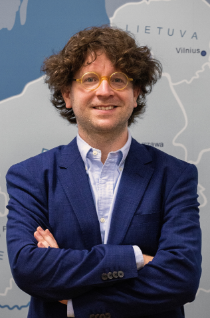12:00 – 12:10: Welcome (University of Trieste / University of Continuing Education Krems)
12:10 – 13:30: “Border” as Contradiction (Debates on Climate Change and Migration)
Borders represent a key tension in debates on climate change and migration. Climate change is inherently cross-border, with greenhouse gas emissions both territorially and temporally dislocated from the impacts of climate change. The geographical borders of nation states cannot prevent the onset or increasing severity of climate hazards, although they form the foundations of the international order tasked with developing governmental responses to limit global heating and cope with its impacts. These same borders play a key role in how we understand migration linked to climate change, with changes in how people migrate increasingly being recognised as a societal consequence of climate change. The border takes on a pivotal role in the discourse, with international cross-border migration receiving the largest share of public and political attention, although empirical research stresses that internal migration within national boundaries is much more prevalent in the context of climate change. Nevertheless, the border has come to represent control and prevention, which absent legal instruments to allow people opportunities to move presents a hurdle to mobility that itself creates precarity and feeds into vulnerabilities of people trying to move to cope with climate impacts.
This panel focusses on the role of borders in debates on climate change and migration and the productive effects of bordering practices on people impacted by climate change.
Speakers:
12:10 – 12:30: Sarah Nash-Haider (University for Continuing Education Krems): The Border and the Other in European discourses on climate and migration
12:30 – 12:50: Giovanni Bettini (Lancaster University): Towards climate nomadism? Displacement and escape in the face of planetary crises
12:50 – 13:10: Simona Capisani (Durham University)
13:10 – 13:30: Discussion, Q & A
13:30 – 14:30: Lunch
14:30 – 16:10: “Border” as Identity (Identity Conflicts in the Upper Adriatic Region)
The Upper Adriatic region is situated at the intersections of state, linguistic, and national-cultural borders that have been perceived, constructed, and transcended throughout history. Identities in this context are not closed entities but rather situational and historically contingent on self-positionings, i.e. essentially constructions. Categories such as “Italians,” “Croats,” and “Slovenes” have been predominantly external attributions, associated with varying advantages or discriminations over time. Ethno-national categories often overshadowed other identities (such as religious, social, or political ones).
This panel explores how identities in the Upper Adriatic region have been negotiated and constructed, and how new borders have emerged through identity constructions.
Speakers:
14:30 – 14:50: Laura Downs (European University Institute): The association Assistenza all’Italia Redenta and the social management of teachers’ labor in Italy’s northeastern borderlands, 1919-1940
14:50 – 15:10: Daša Ličen (Slovenian Academy of Sciences): Animal Welfare and Social Boundaries in late Habsburg Trieste
15:10 – 15:30: Gabriele Mastrolillo (University of Trieste): The debate over the Upper Adriatic Border between the Italian and Yugoslav Communist Parties during the Partisan War
15:30 – 15:50 Francesco Toncich (University of Ljubljana): Making New Borders, Legal Belonging and Mobility through Public Health in the post-Habsburg Alps-Adria Macro-Region: A Transnational Perspective (1918–1924)
15:50 – 16:10: Discussion, Q&A
16:10 – 16:20: Break
16:20 – 18:00: “Border” as Crisis (Exclusionary Discourses and Networks of Populism)
Populism promises “unity” and “order,” making it fundamentally anti-pluralistic. The object of right-wing and left-wing populist discourses (“the people”) is created and sustained through exclusions – against “others” and “dissenters.” By referring to a “unified people,” populisms exclude representative forms of politics in a pluralistic society (such as parliamentary systems) as well as institutions of minority protection (such as constitutional jurisdiction controlling legislative majorities). They create virtual divisions between “majority” and “minority” through the act of drawing borders.
This panel aims to examine populist discourses and “border”-drawing against the “others” / “foreigners” from political and legal perspectives.
Speakers:
16:20 – 16:40 Roberta Altin (University of Trieste): Migrations in the Trieste Borderland: 'Border' to order or to otherness?
16:40 – 17:00: Elisabeth Donat (University of Continuing Education Krems): Cross-border cooperation as key resource during crisis and beyond: Focus groups with regional MPs in four European countries
17:00 – 17:20: Melanie Jaindl (Independent Researcher, Vienna): Visual Securitization of Borders and Others: An Intersectional Approach to the Fence in Subotica/Röszke
17:20 – 17:40: Mattia Zulianello (University of Trieste): Capire il populismo tra miti e realtà
17:40 – 18:00: Discussion, Q & A
18:10 – 18:45: Conclusions

